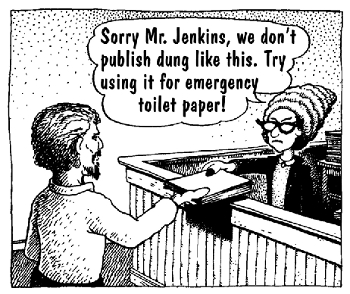
The Humanure Handbook
 The
Humanure Handbook is
another book that epitomizes self-publishing. There are some
flaws here and there --- rants that will turn 80% of the audience off
and scattered trains of thought --- but the positives far outweigh the
negatives. Instead of producing a book watered down
for the masses,
Joseph Jenkins has distilled his passion for composting toilets into
250 pages of essential reading for the serious humanure advocate.
(Plus, there are fun cartoons.)
The
Humanure Handbook is
another book that epitomizes self-publishing. There are some
flaws here and there --- rants that will turn 80% of the audience off
and scattered trains of thought --- but the positives far outweigh the
negatives. Instead of producing a book watered down
for the masses,
Joseph Jenkins has distilled his passion for composting toilets into
250 pages of essential reading for the serious humanure advocate.
(Plus, there are fun cartoons.)

Due to our book club Wednesdays
and popular meat
rabbit Tuesdays, my
humanure lunchtime series is going to be scattered across the next two
weeks. That gives you plenty of time to pick up a copy and read
along...especially since you can download a
digital version entirely free. Stay tuned to learn
why we don't compost our humanure yet and what kind of system we'd like
to use if and when we do.
| This post is part of our The Humanure Handbook lunchtime series.
Read all of the entries: |
Want more in-depth information? Browse through our books.
Or explore more posts by date or by subject.
About us: Anna Hess and Mark Hamilton spent over a decade living self-sufficiently in the mountains of Virginia before moving north to start over from scratch in the foothills of Ohio. They've experimented with permaculture, no-till gardening, trailersteading, home-based microbusinesses and much more, writing about their adventures in both blogs and books.
Want to be notified when new comments are posted on this page? Click on the RSS button after you add a comment to subscribe to the comment feed, or simply check the box beside "email replies to me" while writing your comment.

IMO, chapter 1 & 2 can safely be skipped. E.g. the comparison of Earth to Mars in chapter 1 is just plain wrong.
I've just started chapter 3. There is good stuff there, and a lot of the material is referenced. The author does take some time to get to the point, now and then.
The section on the ability of compost to degrade pollutants seems a bit weak at some points; it often doesn't mention the original concentration of pollutants. The anecdote that microorganisms removed cesium contamination seems doubtful; its source is an interview in Acres USA, which we've come across before as not the greatest source of good information. Also the fact that composting can remove traces of explosives like RDX and TNT is not that surprising; those are nitrogen-rich compounds.
All in all, I think chapter 3 makes a good case for thermophilic composting (the main benefit IMO is controlling harmful organisms).
Hi Irma, the post about my humanure toilet in my blog should be linked in my name. Just click on it and you will fly there.
Yes, my toilet was designed around the one in book. I use rice hulls instead of sawdust, but the "end" result (hee hee) is the same.